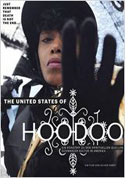

Opening 26 Jul 2012
Directed by:
Oliver Hardt
Writing credits:
Darius James, Oliver Hardt
Before watching The United States of Hoodoo, I can only offer you this one piece of advice: leave your preconceived notions at the door and open your mind as you join Darius James on his journey to understand the roots of voodoo within the United States and how it connects with the African culture that would eventually lead to the Afro-American culture. Having grown up a hop, skip, and a throw away from the Louisiana border and not far from the Mississippi delta, I was able to follow the course of the movie with ease, understanding the uneasiness with which southerners react when hearing about voodoo. Voodoo (also known as hoodoo, juju, and many other names) is dismissed as being devil worship. You don’t practice it, but, most have at least an incredible respect for it. In recognizing these themes and mindsets, I felt I was able to connect with what James was trying to enlighten himself on.
James, himself, starts in New York with a Haitian musician who works wonders with digital technology, drums, and chants common to her culture. The stage is set for frequencies in life and how they make up the very fabric of which we view reality. As I said, notions at the door, people, you can only appreciate this journey if you stop judging before you even start.
James makes his way down to the Mississippi delta to learn about musician Robert Johnson, a man responsible for blues and how they would later shape the music world. Johnson was known as having a “voodoo mystique” about him, having sold his soul to the devil at the crossroads and, in return, getting a perfectly tuned guitar to weave his spell with music. James touches lightly on this subject before moving even further down South to the voodoo capitol of the United States, the Big Easy, New Orleans itself. Once again, music, frequency, and voodoo weave into each other as history and culture collide. The roots of slave culture, Native American culture, and music is introduced in the sweltering heat of Louisiana as James introduces the audience to different voodoo churches and their beliefs. Most, upon hearing voodoo, think of animal sacrifice, demon worship, and negative connotation. James manages to skip across that, somehow, and show his viewers one side of the perception of voodoo and how it connects to the cultures explored.
I have to say, I enjoyed this documentary. It brought a fresh view to something wildly ignored within the American culture. How much do we really know about the slaves, their culture, their way of life? What religious practices were held? Why, upon hearing mention of it, do we automatically assume the worst? To find some of the answers to these questions, and to find new questions relating to it all, watch this documentary and prepare yourself for an unexpected journey into a side of the United States I guarantee you have yet to see. (Kara Wahn)